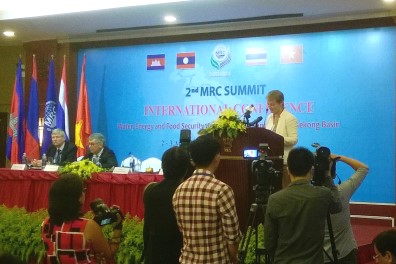Addressing the summit, Dr. Schaefer-Preuss referred to the longstanding initiative of ADB, UNDP, and UNESCAP in regularly producing a monitoring report on the accomplishments of the Millennium Development Goals (MDGs). The latest version is entitled “Asia Pacific Aspirations – Perspectives for a Post 2015 Development Agenda. Asia Pacific Regional MDGs Report 2012/2013”.
“On the lessons to be learnt from the MDGs I would like to highlight the findings of the Asia Pacific Aspirations Report, which noted the need for more integration in the development agenda, and also a need for enhanced emphasis on gender and partnerships. The world has changed since the MDGs in 2000. Worldwide, but particularly in Asia, the issues of persistent poverty, rising income inequality, continuing food insecurity, gender disparities, demographic change, urbanization, and environmental degradation will need to be tackled. All of these priority areas are directly related to water management,” said Dr. Schaefer-Preuss.
Although the MDG process puts a focus on water, sanitation and hygiene, its targets on the broader questions of water resources management have not been not so clear, said the GWP Chair.
“In particular, the MDGs did not place sufficient emphasis on integrated water management in the context of environmental degradation and enhanced resource utilization to meet interrelated development goals.”
This needs to change, said the Chair as she wrapped up her speech. In connection to World Water Day on 22 March 2014, some 57 Permanent Representatives at the UN signed a call for a dedicated water goal in the Post-2015 Development Agenda.
“It is not yet certain that this will be achievable. The UN Open Working Group is currently considering some 19 goals in all, some of which may be combined or reframed to enhance integration across areas. Others have proposed no more than 10 goals where water would be a target or sub-target within some these more integrated goals. What is clear is that water must be highly visible in the Post-2015 framework, with coherent indicators, targets and metrics to ensure our success.”
The MRC summit gathered over 250 participants, including the Prime Ministers of the Mekong River Commission (MRC) Member Countries Cambodia, Lao PDR, Thailand, and Vietnam, as well as delegations from China and Myanmar and regional leaders, water experts, and diplomats. The summit aim was to address the most important issues on the Mekong River and set strategic directions for the MRC. GWP Southeast Asia and GWP CACENA were also actively participating in this event.
The complete speech of Dr. Ursula Schaefer-Preuss is available here.
Top photo: Dr. Ursula Schaefer-Preuss speaking in Ho Chi Minh City, Vietnam.

